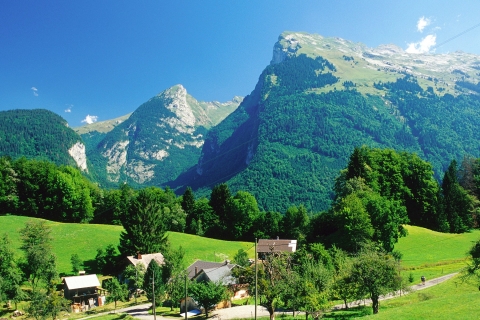Chamonix-Mont-Blanc Weather and Climate: A Comprehensive Guide
Chamonix has a humid continental climate and the weather is greatly influenced by the height and location of the valley. The higher one goes, the colder and wetter it becomes. At the highest point of the Mont Blanc all precipitation is snow and the average temperature is at least 20°C lower than in Chamonix itself. From 2500 meters (8202.1 ft) high, the area is snow-covered in winter. Above 3300 meters (10826 ft) it snows in summer as well.
Average maximum day and minimum night temperature
Depending on the time of the year, temperatures range from pleasant to very cold in Chamonix-Mont-Blanc. Typically, average maximum daytime temperatures range from a pleasant 18°C in July to a very cold -3°C in the coolest month, January.
Nights are cooler, with lows often dropping to around -12°C during the colder months.Check out our detailed temperature page for more information.
Temperature ranges by month
Precipitation and rainy days
Chamonix-Mont-Blanc has a relatively rain/snowy climate with high precipitation levels, averaging 1684 mm of rain/snowfall annually. Precipitation levels in Chamonix-Mont-Blanc remain relatively steady throughout the year. December has the most snow, with 168 mm over 16 days. In October, this drops slightly to 119 mm, making the city's climate fairly predictable.
The mean monthly precipitation over the year, including rain, hail and snow
Sunshine over the year
For those who appreciate different seasons, Chamonix-Mont-Blanc serves as an ideal destination. Expect longer, more sun-filled days in July with an average of 9.2 hours of sunshine daily, and embrace the darker days in January, offering only 2.3 hours of daily sunlight.
Visit our detailed sunshine hours page for more information.
Monthly hours of sunshine
Daily hours of sunshine
broken clouds and slight sleet overcast and sleet broken clouds and no rainForecast for Chamonix-Mont-Blanc
Select a Month of Interest
Check the conditions for any month of the year.
The best time of year to visit Chamonix-Mont-Blanc in France
Other facts from our historical weather data:Most rainfall (rainy season) is seen in January, May, June, July and December.
The coldest season / winter is in the following months: January, February, November and December.
July has an average maximum temperature of 18°C and is the warmest month of the year.
The coldest month is January with an average maximum temperature of -3°C.
December tops the wettest month list with 168 mm of rainfall.
October is the driest month with 119 mm of precipitation.
July is the sunniest month with an average of 275 hours of sunshine.
No idea where to travel to this year? We have a tool that recommends destinations based on your ideal conditions. Find out where to go with our weather planner.




